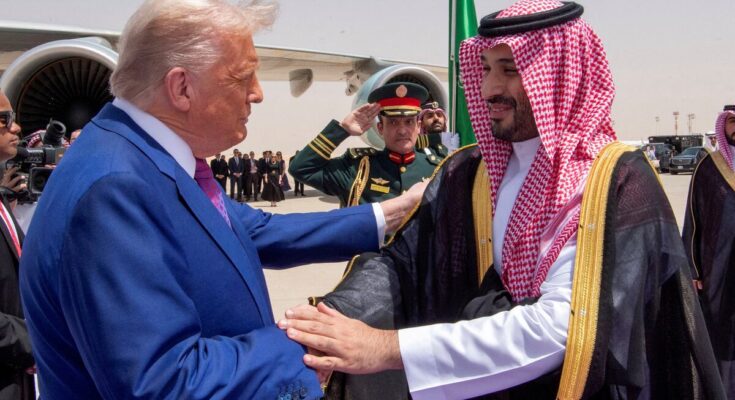Seven years after his last trip to Washington and after the murder and dismemberment of journalist Jamal Khashoggi on his orders according to US intelligence, the Crown Prince of Saudi Arabia, Mohamed bin Salmán, returns to the White House on Tuesday for a full honors visit to deepen relations and during which he could sign a series of economic and security agreements. On the eve of the meeting, Donald Trump personally confirmed that he will authorize one of his partner’s great aspirations: the purchase of F-35 fighter planes, among the most modern in the world.
“It will be more than a meeting. We will honor Saudi Arabia, the crown prince,” US President Donald Trump said this weekend of the crown prince’s two-day visit to Washington, which will also include a large business forum at the capital’s Kennedy Center. The program includes an official welcome ceremony, including cannon shots, a meeting in the Oval Office and a gala dinner with guests from the business, political and military world: it is in all respects a state visit, even if it cannot be called that because Bin Salman is not the head of state of his country, a position held by his father, King Salman bin Abdulaziz.
Trump does not hide what he is looking for in this series of conversations that he will have with one of the world leaders with whom he has the closest relationship and in whose country the company managed by his children, the Trump Organization, maintains great interests. The American president, who consciously decided that Riyadh would be the first stop on his first foreign trip in his second term, aspires for Saudi Arabia to join the Abraham Accords for normalization between Israel and Muslim countries.
The Republican, who considers these pacts the great foreign policy achievement of his first mandate, is trying to give them new impetus – the White House has announced the signing of Kazakhstan and Indonesia – and the addition of Riyadh, the great economic engine of the Middle East and custodian of Muslim holy places, would be the grand finale.
“The Abraham Accords will be part of what we face,” Trump told reporters this weekend who accompanied him on his trip to his private residence, Mar-a-Lago, Florida. “I hope Saudi Arabia will join the Abraham Accords soon.”
Riyadh is in no hurry to sign these pacts. He conditions his yes on the definition of a roadmap for the creation of a Palestinian state, which does not appear in the peace agreement for Gaza proposed by the Trump administration.
Bin Salman, for his part, aspires to secure security guarantees for his country, access to artificial intelligence technology and, perhaps, progress in US support for a civilian nuclear energy development program during his talks in Washington.
Riyadh wants an agreement similar to the one reached by Qatar, another of this republican administration’s great Arab allies, last September. Then, Trump signed an executive order guaranteeing the emirate that the United States will come to its defense if it is attacked by a third country, in a commitment similar to that offered by Article 5 of NATO.
For years, Saudi Arabia has sought a defense treaty with the United States that would be ratified by Congress in Washington – the highest possible level for a bilateral pact. Riyadh called for this step as part of the concessions required to sign the Abraham Accords and thus strengthen Washington’s network of alliances in the region against Iran.
But the outbreak of war in Gaza, and related developments in the region, have changed the calculations. The US attack on nuclear targets in Iran last June was the final blow, after attacks by Israel on Hezbollah in Lebanon and by Americans on Houthi militias in Yemen, to leave Tehran and the radical groups supported by that country weaker than at any time in decades.
Washington conditions a treaty on Riyadh agreeing to join the Abraham Accords, and Saudi Arabia seems to be satisfied, for the moment, with a solution similar to that of the Qatar case: a written statement of support, but which, without the support of Congress, would not have the same legal guarantees.
The Saudi regime also aspired to obtain approval from the United States to purchase F-35 stealth fighter jets, for nearly one hundred million dollars each. “I would say we will, we will sell them the F-35s,” Trump confirmed in statements in the Oval Office on Monday. “They have been a great ally,” he insisted, referring to Riyadh.
Providing these fighters to Riyadh will not be an easy task. The White House will have to find, among other things, a way to assure Congress that the modern technology of these planes will not fall into the hands of rival countries such as Russia and China if they are handed over to Saudi Arabia. Trump promised those planes to the United Arab Emirates, but that alliance of small kingdoms has yet to see even one of the promised packages.
Harmony and deal-making will not be limited to the military aspect of the relationship. Trump wants to continue the commitment launched by Saudi Arabia six months ago, during his visit, of an investment of 600 billion dollars in the United States. Bin Salman may withdraw a deal to import semiconductors for artificial intelligence and, perhaps, some sign of progress in developing his nuclear energy program.
The crown prince’s visit comes a week after former jihadist leader and current Syrian president Ahmed Al Shara also met with Trump in the Oval Office for a meeting dominated by security issues. The American-Saudi meetings also come after a trip to Washington last week by Saudi Defense Minister and brother of the crown prince, Khaled bin Salman, during which he met with Pentagon chief Pete Hegseth. “We explore ways to promote our strategic cooperation. We also deal with regional and international events,” the minister wrote after these contacts.



